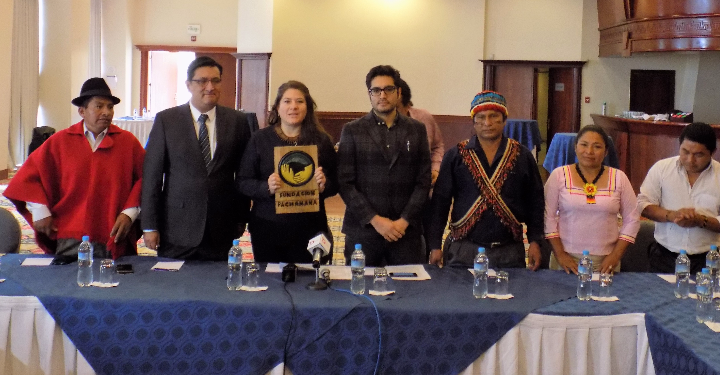Lea el artículo en español aquí.
With the reinstatement of Fundación Pachamama, a four-year injustice has finally been righted. Following years of lobbying by members of the organisation, the Ministry of the Environment finally announced that the decision to close the Foundation’s offices and dissolve their legal status had been reversed.
‘This is a historic victory for civil society and the indigenous and environmental movement in Ecuador, which has worked tirelessly for the protection of human rights,’ said Juan Auz, Executive Director of the Fundación Pachamama and former ISHR trainee.
What happened in 2013?
Fundación Pachamama is dedicated to the respect of the rights of indigenous peoples and the conservation of Amazon ecosystems.
It was closed in 2013 by Executive Decree – a much criticized instrument – after the then President Rafael Correa used the platform of his weekly TV and radio programme to call for the foundation to lose its right to operate. Fundación Pachamama was provided no opportunity to challenge the accusations made against it or the decision.
Four years attempting to reverse the decision began, with very limited available options at national level.
‘It was almost impossible to get an Ecuadorian Court to give us a hearing and acknowledge that our constitutional rights had been violated. We saw that only through lobbying at the international level would we get our voice heard,’ said Auz.
Members of the organisation looked to the regional and international human rights mechanisms to raise awareness of the violations experienced in their case and seek redress.
Example of a widespread problem
The experience of Fundación Pachamana is not unique in Ecuador or elsewhere in the region. A string of closures of other Ecuadorian NGOs have been condemned by several UN experts.
‘Dissolving groups is the most severe type of restriction on freedom of association,’ said the then Special Rapporteur on the Rights to Freedom of Peaceful Assembly and of Association, Maina Kiai.
Closure of NGOs is aimed at silencing critics and forcing human rights defenders to commit their resources to legal and administrative processes rather than their core work.
‘Gaining back civic space is incredibly time-consuming and exhausting for organisations,’ said Juan Auz. ‘In particular for those working at local level that don’t have large budgets, or have access to possible required expertise. They need to move from defending rights, to permanent self-defence.’
‘In the case of Fundación Pachamama we had to focus on our survival.’

Adapting to survive
To continue the work of Fundación Pachamama and organise its defence, a new organisation, Terra Mater, was founded.
‘This was very important as government-backed extractive projects were spreading across the ancestral lands in the Amazon,’ said Auz. ‘We adapted to survive and to continue the work we’d been doing for 20 years alongside local communities.’
Breakthrough
The reinstatement of Fundación Pachamama comes with a change in government in the country and a change of approach.
‘The new government proposed a national dialogue in which various collectives, including national indigenous collectives, and a wide spectrum of civil society organisation participated. In this context, we had our voices heard.’
The Ministry of the Environment agreed to re-consider the case, accepting that errors and irregularities that had led to the dissolution of the organisation were a clear violation of the right to freedom of association.
Call for a new law
With this victory under their belt, the Fundación is calling for legislative changes to guarantee the rights of human rights defenders.
‘We urge the government to establish a participatory process to define a law guaranteeing the rights of civil society organisations and protecting the work of human rights defenders and those working to defend the environment,’ said Auz.
Fundación Pachamama is committed to keeping up its work in the Amazon, with the mission of protecting the Sacred Headwaters of the Napo and Marañón Rivers and strengthening the processes for the defence of collective, territorial and environmental rights.
For more information see the Fundación Pachamama press release #SeguimosEnPie
Photos and Video: Fundación Pachamama and ISHR





